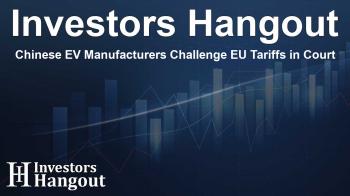Chinese EV Manufacturers Challenge EU Tariffs in Court

Chinese Electric Vehicle Manufacturers Contest EU Tariffs
Chinese electric vehicle (EV) makers are making headlines as they challenge the new import tariffs imposed by the European Union. Companies such as BYD, Geely, and SAIC have officially filed their grievances at the Court of Justice of the European Union, seeking to overturn the tariffs that they believe are unfair and damaging to their business operations.
Background on the Tariffs
The EU decided to impose these tariffs at the conclusion of an anti-subsidy investigation conducted towards the end of October. The tariffs include a 17.0% charge for BYD, 18.8% for Geely, and a staggering 35.3% for SAIC, on top of the standard 10% car import duty applied across the board. This significant financial burden has raised concerns among the targeted manufacturers.
Filings and Court Proceedings
The filings from these three manufacturers have been recorded at the General Court, one of the two chambers of the CJEU. They submitted their complaints just a day before the filing deadline, reflecting the urgency of their situation. Legal proceedings in this court typically span around 18 months, allowing for the possibility of appeals, which adds another layer of complexity to the ongoing dispute.
Response from the European Commission
The European Commission has acknowledged the existence of these legal challenges and is now preparing its defense, which they'll need to complete within a specified timeframe of two months and ten days. The Commission’s decision to proceed with these tariffs was made independently, raising questions about the underlying motivations and the fairness of the process.
Potential Wider Impact and Other Challenges
While attention is focused on BYD, Geely, and SAIC, it's uncertain whether other EV manufacturers, including those based in Europe and producing in China, are also pursuing similar legal challenges. Notably, the China Chamber of Commerce for Import and Export of Machinery and Electronic Products has been representing various Chinese EV producers, indicating a potential for a broader legal front.
Arguments Against the Tariffs
The challenges presented by these manufacturers may elaborate on several critical arguments. They could contest the methods used to assess subsidies, highlight the injury inflicted on EU industries, and question the Commission's unusual steps in launching a tariff case without a formal industry complaint.
SAIC's Unique Position in the Case
Of particular interest is SAIC, which has been handed a notably higher tariff compared to its competitors. This situation arose because the company reportedly did not cooperate with the investigation, leading to the Commission filling gaps with selectively available information. This aspect will likely be a significant point in their challenge.
The Tesla Factor
In this unfolding situation, Chinese EV makers have also raised concerns regarding Tesla, the leading exporter of EVs from China into the EU market. Tesla was not included in the official sampling process, which is pivotal because it affects the tariff rates assigned to other companies. Had Tesla been part of this sample, the cooperating entities like BYD, Geely, and SAIC would have enjoyed a lower tariff rate than the currently imposed 20.7%.
Looking Ahead
This legal battle among Chinese EV manufacturers and the EU is likely to be long and complex. As the cases develop within the CJEU, stakeholders will be closely observing the implications for international trade and the emerging electric vehicle market. The outcome could significantly influence the dynamics of competition in the EV sector, not only in Europe but also globally.
Frequently Asked Questions
What prompted the EU to impose tariffs on Chinese EVs?
The EU imposed tariffs following an anti-subsidy investigation aimed at protecting local markets from unfair competition.
Which Chinese EV manufacturers are challenging the tariffs?
BYD, Geely, and SAIC are the primary manufacturers contesting the imposed tariffs.
What are the specific tariff rates for these manufacturers?
BYD faces a 17.0% tariff, Geely has an 18.8% tariff, and SAIC is subjected to a 35.3% tariff.
How long do court proceedings typically last in this case?
Procedures at the General Court generally last around 18 months, after which appeals may be possible.
What role does Tesla play in this tariff controversy?
Tesla's exclusion from the tariff sampling process may have led to higher rates for other Chinese manufacturers, raising disputes regarding fairness.
About The Author
Contact Addison Perry privately here. Or send an email with ATTN: Addison Perry as the subject to contact@investorshangout.com.
About Investors Hangout
Investors Hangout is a leading online stock forum for financial discussion and learning, offering a wide range of free tools and resources. It draws in traders of all levels, who exchange market knowledge, investigate trading tactics, and keep an eye on industry developments in real time. Featuring financial articles, stock message boards, quotes, charts, company profiles, and live news updates. Through cooperative learning and a wealth of informational resources, it helps users from novices creating their first portfolios to experts honing their techniques. Join Investors Hangout today: https://investorshangout.com/
The content of this article is based on factual, publicly available information and does not represent legal, financial, or investment advice. Investors Hangout does not offer financial advice, and the author is not a licensed financial advisor. Consult a qualified advisor before making any financial or investment decisions based on this article. This article should not be considered advice to purchase, sell, or hold any securities or other investments. If any of the material provided here is inaccurate, please contact us for corrections.

